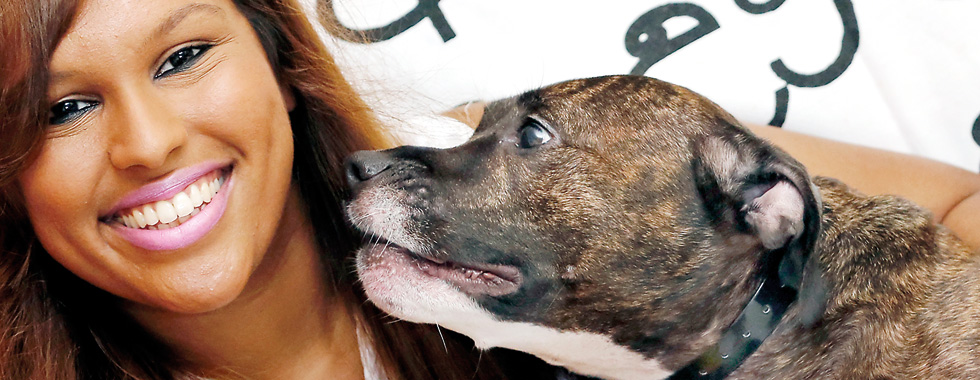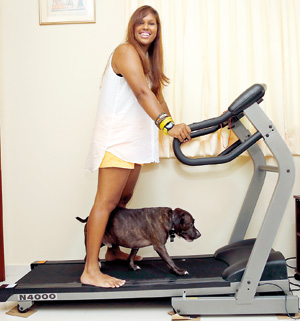A way with dogs

Melissa and Major: Tough love. Pic by M.A. Pushpa Kumara
When Major comes into the room, everybody ignores him – not a look or a word or even a surreptitious pat. We’re all following Melissa Stephens’ instructions to the T. It’s only after the burly little pit bull has had a chance to calm down that we introduce ourselves but as a result of the wait there is no growling, barking or excited leaping about. Major is on his best behaviour – and so are the people in the room.
Melissa likes to describe herself as a dog psychologist but if there’s one thing she’s realized is that while the problem may be half canine, it is also equally likely to be half human. The trick is in maintaining high levels of energy and confidence, she says – “animals don’t follow unstable pack leaders. They follow those they feel protected by, and if they don’t they will try to take the pack leader position.” Melissa doesn’t train dogs to sit or roll over, rather she works with problem cases to help human and animal coexist.
The 23-year-old has learned entirely on the job. Melissa says that being born into a house that had dogs was the start of her fascination with them. Her first dog was a Boxer, and in wanting to learn how to train and take care of him she began to study in earnest. As she moved around, first to Singapore and then later to Australia she maintained her interest in the subject. For a while she worked as a professional dog walker, and says she routinely managed eight dogs at a time – all of whom were off the leash.

Dogs need plenty of exercise: Melissa and Major on the treadmill
Soon she was helping families with difficult pets. She first gained real confidence when she intervened to help manage an aggressive Rottweiler who would often attack the youngest child in the family. Her clients were ready to give the dog away and Melissa was their last shot. She began as she frequently does, by separating the dog from his or her humans. “I usually like to meet the dog without the influence of the family.” Within two hours she had effected a transformation – “I just stayed calm and showed the owner how to claim her space, and claim her son. The pack leader in that house was the Rottweiler and we had to change that.”
Establishing that kind of authority over the animal appears to be a matter of consistency and firmness.How you meet a dog matters – they’re so rooted in their sense of smell that it forms their primary impression of you. You needn’t even hold out your hand to make friends, they’ve smelled you as soon as you’re in the house. When it comes to discipline, it’s something that should never be done in anger or with an intention to hurt the animal.
Instead Melissa demonstrates a firm, five-fingered prod that mimics the way a mother dog grips her puppy. The “snap and release” motion is enough to establish dominance and distract the dog, but Melissa will only use it if the animal doesn’t respond to a verbal command. Melissa identifies a lack of exercise as being one of the primary drivers of aggression and difficult behaviour in animals. A dog really needs at least half an hour to an hour of exercise every day. More energetic animals need even more. If you’ve adopted a stray, you have on your hands a real nomad who might be used to walking for as long as eight hours. Even how you walk the dog is crucial – the dog must stay behind you, to establish who is in charge.
“Puppies are not born aggressive,” she says using the pit bull which has a fearsome reputation yet has also been dubbed one of the best breeds for therapy dogs. “These are powerful animals. They can be aggressive, but that same power can be turned into love.” She emphasizes the value of prompt discipline. For instance, people often struggle to toilet train their puppies. Melissa’s solution involves establishing a routine where the dog is taken for a walk at a regular time and rewarded with praise and love for peeing outside the house.
If they are peeing inside, you want to admonish them and then lift them out and carry them outside. A little praise after they’ve done their business there will take you a long way. The traditional method of pushing their snout in the pee and administering a few whacks actually does more harm than good, advises Melissa, explaining that it leaves the animal confused.
Melissa shares this and other wisdom for a fee of Rs.2,000 – Rs.5,000. Her sessions vary in length and are based on achieving a goal with the dog rather than on time. Often she only needs one session but in dire cases, she may meet an animal once every fortnight for three months.
It also adds to her colourful personality that in her spare time, she’s an aspiring musician. A rapper with a track of her own with Grammy-award winning producer Scott Mathews, she enjoys performing. (‘Believe’ is up on YouTube and SoundCloud and is available for sale on Itunes.)
Find Melissa online atFacebookcom/DogTimeSL or on Twitter as @MelissaCStephen


